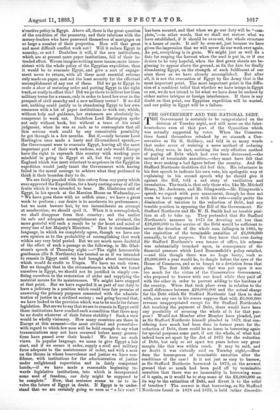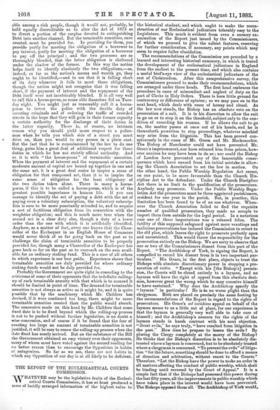THEGOVERNMENT AND THE NATIONAL DEBT.
THE Government is certainly to be congratulated on the division of Tuesday night, and still more on the faint- heartedness even of that part of the Opposition which was actually supported by votes. When the Conserva- tives found themselves rebuked by so staunch a Con- servative as Sir G. Goldney, and told in so many words that under cover of resisting a mere method of reducing Debt, they were, in fact, resisting the only effective method of paying off Debt which had ever been discovered,—the method of terminable annuities,—they must have felt that they were making a bad figure before the country. And Sir Stafford Northcote doubtless did feel this. His reluctance in his first speech to indicate his own vote, his apologetic way of explaining in his second speech why he should give it against the Bill, told a sad story of vacillation and irresolution. The truth is, that only those who, like Mr. Mitchell Henry, Mr. Anderson, and Mr. Illingworth—Mr. lllingworth's speech we regard with pure amazement, though he does not seem to have supported it with his vote—really prefer the diminution of taxation to the reduction of Debt, had any tenable position in opposing the Bill of the Government. Sir Stafford Northcote and Mr. W. H. Smith had no tenable posi- tion at all to take up. They pretended that Sir Stafford Northcote's measure in 1875 for devoting not less than £28,000,000 to the service of the Debt would be sufficient to secure the devotion of the whole sum falling-in in 1885, by the expiration of the terminable annuities of £6,000,000 annually, to that purpose. Yet they know that even during Sir Stafford Northcote's own tenure of office, his scheme was substantially trenched upon, in consequence of the financial pressure which Lord Beaconsfield's policy entailed, —and this though there was no huge booty, such as £6,000,000 a year would be, to dangle before the eyes of the House of Commons, and so to tempt to a deviation from that plan. The first little strain that was put upon it was too much for the virtue of the Conservative Government, who proposed to borrow with one hand while they paid off with the other in order to prevent adding to the burdens of the country. When that took place even in relation to the small difference between £28,000,000 and the actual charge for the Debt which Sir Stafford Northcote had then to deal, with, can any one in his senses suppose that with £6,000,000 revenue unappropriated except for Sir Stafford Northcote's Act touching the payment of Debt, there would have been any possibility of securing the whole of it for that pur- pose V Would not Member after Member have pleaded, just as Sir Stafford Northcote himself pleaded in 1879, that con- sidering how much had been done in former years for the reduction of Debt, there could be no harm in borrowing again for special purposes some part, if not the whole, of what had indeed been set apart by the Act of 1875 for the reduction of Debt, but only so set apart ten years before any great margin like this was within reach. It may be said, and no doubt it was virtually said on Tuesday night,—How does the hocus-pocus of terminable annuities alter the conditions of the case 3 Is it not just as easy to borrow, as Sir Stafford Northeote borrowed in 1879, on the avowed ground that so much had been paid off by terminable annuities that there was no immorality in borrowing some of it again, as it would be to stop some of the £6,000,000 on its way to the extinction of Debt, and divert it to the relief of taxation f The answer is that borrowing, as Sir Stafford Northcote found in 1878 and 1879, is held rather discredit-
able among a rich people, though it would not, probably, be held equally discreditable so to alter the Act of 1875 as to divert a portion of the surplus devoted to extinguishing Debt into another channel. But the terminable annuities, once created, must be provided for. In providing for them, you provide partly for meeting the obligation of a borrower to pay interest, partly for meeting the obligation of a borrower to pay off the principal ; and the two processes are so thoroughly blended, that the latter obligation is sheltered under the shadow of the former. In this way the nation helps itself to identify absolutely the two obligations,—as, indeed, so far as the nation's means and wealth go, they ought to be identified,—and to see that it is falling short of its duty whenever it fails to meet those obligations, though the nation might not recognise that it was falling short, if the payment of interest and the repayment of the Debt itself were not inextricably blended. It is all very well to call this a hocus-pocus, as some able financiers did on Tues- day night. You might just as reasonably call it a hocus- pocus to invest the police with the double duty of arresting criminals and of ordering the traffic of crowded streets in the hope that they will gain in their former capacity a certain authority for the discharge of their duties in
the latter capacity. There is, of course, no intrinsic reason why you should yield more respect to a police- man when he tells you which side of a street you must drive on, than you would to any person in a plain coat. But the fact that he is commissioned by the law to do one thing, gains him a great deal of additional respect for those duties in which he has not strictly official authority. And so it is with "the hocus-pocus" of terminable annuities. When the payment of interest and the repayment of a certain moderate amount of capital are bound up together in one and the same act, it is a great deal easier to inspire a sense of obligation for that compound act, than it is to inspire the same sense of obligation for the least obligatory of the two duties taken alone. There is many a hocus- pocus, if this is to be called a hocus-pocus, which is of the greatest possible importance in human life. If you can manage to identify the act of paying a debt with the act of paying even a voluntary subscription, the voluntary subscrip- tion is sure to be more punctually attended to, and to acquire a sort of factitious obligation from its connection with the weightier obligation; and this is much more true when the second act is a clear duty also, though a duty of a lower order than the one with which it is artificially identified. Anyhow, as a matter of fact, every one knows that the Chan- cellor of the Exchequer in an English House of Commons would never think of so far going back on the past as to challenge the claim of terminable annuities to be properly provided for, though many a Chancellor of the Exchequer has gone back so far on the past as to encroach on the sum avail- able for an ordinary sinking fund. This is a case of all others in which experience is our best guide. Experience shows that terminable annuities are duly provided for where ordinary sinking funds would not be duly provided for.
Probably the Government are quite right in conceding to the criticisms of some of their opponents that the indefinite rolling- up of each terminable annuity with that which is to succeed it should be limited in point of time. The demand for terminable' annuities is not always as active as it might be, and it is quite possible that by the machinery which Mr. Childers has, devised, if it were continued too long, there might be more -terminable annuities created than the public would absorb. The concession made on this head by Mr. Childers that some fixed date is to be fixed beyond which the rolling-up process is not to be pushed without further legislation, is no doubt a wise concession, and of course if it be found that the fear of creating too large an amount of terminable annuities is not justified, it will be easy to renew the rolling-up process when the date fixed has nearly arrived. But on the substance of the Bill the Government obtained an easy victory over their opponents, many of whom must have voted against the second reading for no better reason than to encourage the Opposition in habits of antagonism. So far as we see, these are not habits in which any Opposition of our day is at all likely to be deficient.



































 Previous page
Previous page